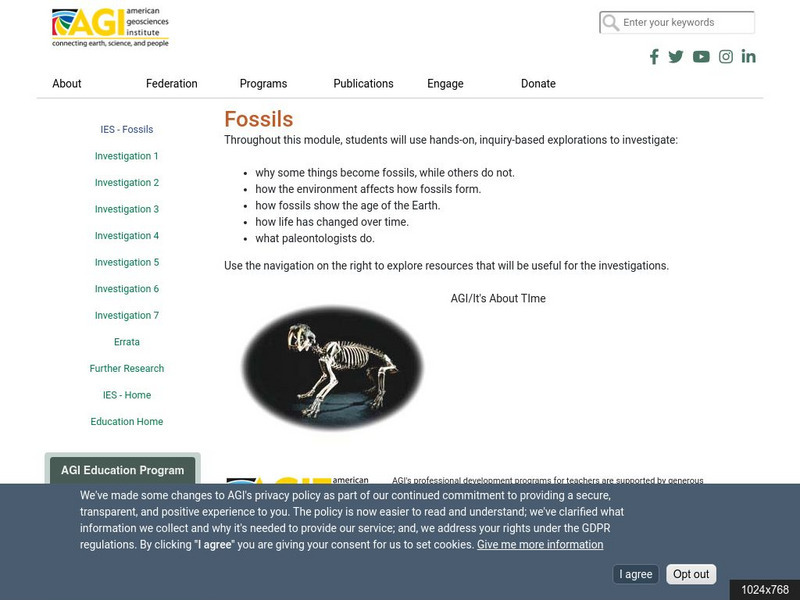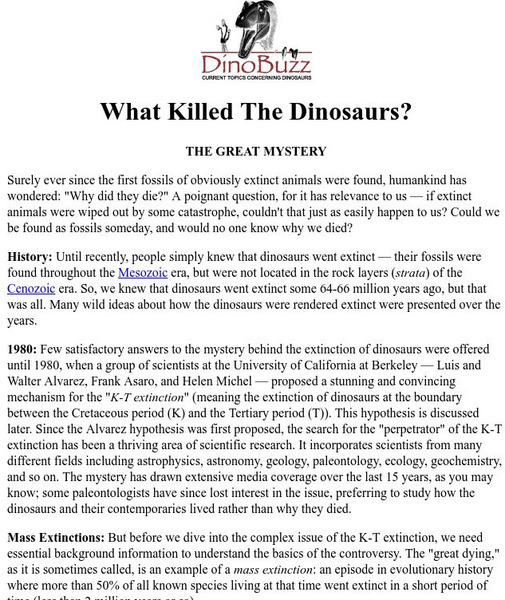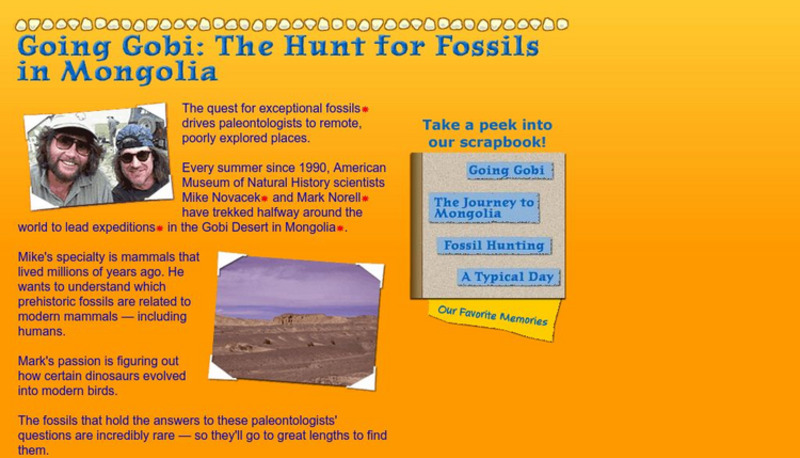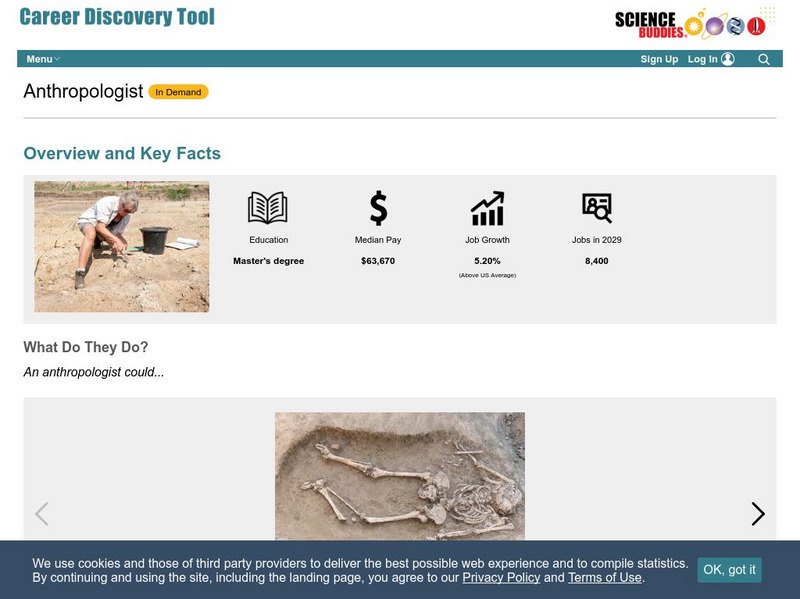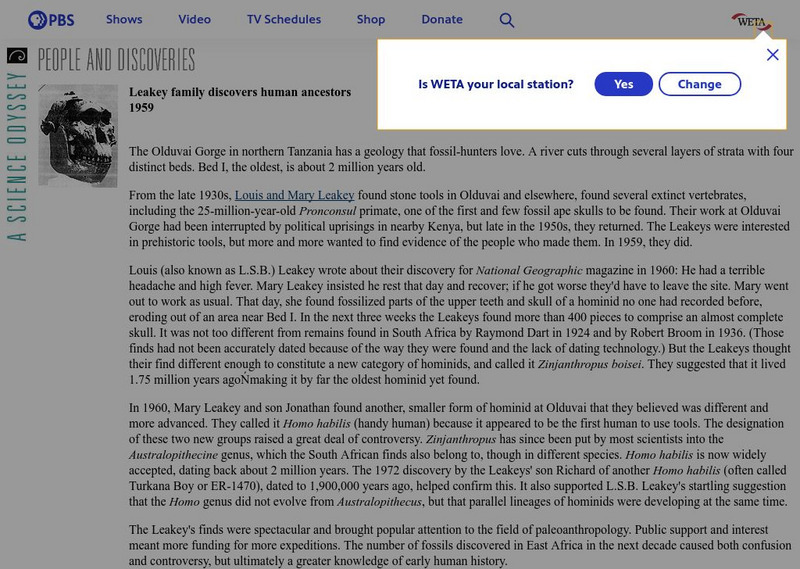Curated OER
Paleogeographic Mapping (o.k. Fossils Are Neat But What Good Are They?)
Students examine how evidence from fossils can be used in paleogeographic interpretation. They gain experience in developing multiple hypotheses.
Curated OER
Where Can I See The Sea?
Students see how the pieces of the fossil puzzle fit together to allow the paleontologist to imagine the earth as it was millions of years ago. They draw a map showing what environments were present in a certain area more than 70 million...
Curated OER
Investigation 4 - Dinosaurs Tracks
Fourth graders make inferences and interpretations from sets of dinosaur tracks. They describe Utah fossils and how they were formed. Partners trade their sketches of tracks and try to guess which dinosaur it belonged to.
Curated OER
Investigation 1 - Identify & Compare Fossils
Fourth graders examine different items to see if they can recognize fossils. This be an introduction to the different fossils they be studying later and help them make inferences about past environments of Utah.
Curated OER
Fossil Footsteps
Fourth graders create their own dinosaur tracks using clay. In addition, 4th graders compose a story about the dinosaur / animal who created the tracks. They study photographs of dinosaur tracks before beginning.
Curated OER
A Scientific Approach to Teaching about Evolution
Students examine fossils and analyzing their significance in relation to theories of evolution. Hand-outs are provided. This lesson could be supplementary to a broader unit on evolution or geology.
American Geosciences Institute
American Geosciences Institute: Fossils
Seven hands-on lessons module where students learn about fossils. These inquiry-based investigations explore how fossils form, properties of fossils, comparing fossils, how they show the age of the Earth, and what paleontologists do.
PBS
Pbs Learning Media: Laetoli Footprints
This Evolution video segment describes how the famous track fossils known as the Laetoli footprints might have been formed and what they can reveal about the creatures who left them.
University of California
Ucmp: A Relative Dating Activity
An learning activity to help students grasp the concept of relative dating and geologic time.
University of California
Ucmp: What Killed the Dinosaurs?
This UC Berkeley site extensively covers the death of the dinosaurs. It includes history, theories, invalid hypotheses, and current arguments.
University of California
Ucmp: The Dinosauria
The Dinosauria provides the latest information about dinosaurs, including debunking myths, early dinosaur discoveries, characteristics of specific dinosaurs, life history, and discovery of dinosaur fossils.
American Museum of Natural History
American Museum of Natural History: O Logy: Going Gobi: Hunting for Fossils
Travel through the Gobi Desert with two paleontologists, and discover ancient fossils of creatures from long ago.
University of Nebraska
Univ. Of Nebraska Museum: Preserving Vertebrate Fossils
This resource details the process by which vertebrate fossils should be excavated and preserved in order to conserve them for as long as possible. It also includes information about the role of amateur fossil collectors and museums.
University of Florida
Fmnh: Vertebrate Paleontology
Has a large group of vertebrate fossil pictures, a guide on preparing fossils, and much more.
Science Buddies
Science Buddies: Get Some Practice at 'Fossil' Reconstruction With Owl Pellets
Although this project is not based on actual fossils, you will get good practice at reconstructing an animal's skeleton from individual bones. The goal of this science project is to identify the types of prey that are consumed by owls by...
Yale University
Yale New Haven Teachers Institute: Evolution of Plants
An extensive coverage of the evolutionary history of plants. Click on a topic in the outline and you'll go to a good discussion on this material.
Science Education Resource Center at Carleton College
Serc: Investigating the Geologic Time Scale: Trends in Geologic Time
In this Earth Science indoor laboratory inquiry, students will create their own geologic time scale based on observation of teacher supplied, historically correct fossil data and also relevant rock samples with the age of the rock sample...
Science Education Resource Center at Carleton College
Serc: Paleotopia: Windows to the Past
A link to a website that contains teacher materials for a game that reinforces the concepts learned about fossils. Students can understand how the record of life on Earth is revealed by fossils as they become paleontologist in this game...
Science Buddies
Science Buddies: Career Profile: Anthropologist
Does examining all aspects of human life appeal to you? Would you like to explore the origins of man, of language, of culture? This Science Buddies site gives a good overview of what is involved in the career of anthropologist. Find out...
Smithsonian Institution
Smithsonian Learning Lab: Digging Up Dirt: How Paleontologists Bring Dinosaurs Back to Life
Teachers can download this teaching package that introduces students to the science of paleontology. Fossil formulation and details about the work of paleontologists are discussed. Find out how paleontologists discover, stabilize, and...
Talk Origins Archive
Talk Origins Archive: Radiometric Dating and the Geological Time Scale
A lengthy article with lots of information about radiometric dating, including pictures and charts.
Smithsonian Institution
Smithsonian Learning Lab: Prehistoric Climate Change and Why It Matters Today
Introduce students to environmental issues by studying a time of rapid global warming that occurred 50 million years ago. Lessons, video segments and interactive activities will engage students as they learn about average annual...
PBS
Pbs: Leakey Family Discovers Human Ancestors
The PBS site covers the Leakey family and their discoveries in Olduvai Gorge in Tanzania. This information was part of a PBS exploration of human evolution.
Other
Denver Museum of Nature and Science: Follow a Fossil
Students examine paleontology, the study of ancient life on Earth. Some topics explored are vertebrates, invertebrates, and plants.






